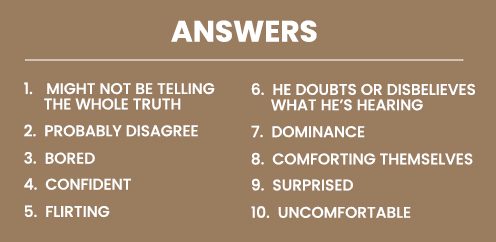Our bodies are continuously sending forth signals, from the sway of a hand to the tilt of a head, that disclose our innermost intentions, feelings, and thoughts. We set out on a quest to solve the puzzles surrounding body language in this blog, by exploring its importance, subtleties, and real-world uses.
What Is Body Language?
Body language is the process of communicating through nonverbal signals like expressions, posture, and gestures. They can confuse, injure, or provide comfort, and confidence. Additionally, these signals continue even after we stop talking.
Why Is It Important?
Body language is important because it supports verbal communication by giving insight into feelings and thoughts which are frequently more truthful than words. It also shapes impressions and professional interactions by influencing perceptions. Gaining control of one's body language fosters successful communication, confidence, and rapport-building.
How to Optimize It?
Optimizing body language begins with self-awareness: maintain open gestures - uncross arms, face others directly, and smile genuinely. Practice confident posture: stand tall, shoulders back. Listen actively, nodding, and make eye contact to show engagement. These concepts can help you communicate more effectively and honestly via body language.
Are There Courses to Learn about Body Language?

Yes, there are numerous courses available to learn about body language. People can learn at their convenience either online or via workshops and seminars. These courses are taught by experts in this field. Whether for personal development or professional growth, these courses enhance interpersonal communication and social awareness. So, definitely try them if you want to improve your body language.
How Body Language Works
At Office

From confident posture in meetings to attentive nods during conversations, nonverbal signals convey professionalism, confidence, and engagement. Maintaining eye contact shows respect and attentiveness, Conversely, crossed arms or fidgeting can signal discomfort. Mirroring colleagues' body language fosters rapport and teamwork. Understanding and using it effectively can enhance leadership, teamwork, and workplace relationships, ultimately contributing to a positive and productive office environment.
At Home

Body language at home speaks volumes in the subtleties of everyday interactions. A gentle touch conveys understanding and support. Shared laughter builds bonds, while a furrowed brow signals concern. Even mundane tasks like cleaning the home and washing dishes together can strengthen connections through shared presence and cooperation. In moments of conflict, crossed arms or avoidance of eye contact may reveal tension and anger. Hence, body language at home serves as the powerful foundation of familial harmony and understanding.
At school/college

Body language plays a crucial role in the school and college environment, shaping interactions among students, teachers, and peers. From attentive posture in class to confident gestures during presentations convey engagement, interest, and respect. By recognizing and utilizing body language effectively, students can enhance their academic experiences, forge meaningful connections, and succeed both academically and socially.
With Spouse

Body language is one of the best means of expressing love, sympathy, and support. Touching the partner's face or arms, peering into their eyes, or offering a consoling hug are some signs that convey love and affection more effectively than words. Furthermore, spouses who are aware of each other's nonverbal signs can communicate effectively even during times of dispute which promotes a stronger emotional bond and understanding between them.
With Friends

Body language may foster understanding and communication in friendships that last for a lifetime. Shared jokes can bring people together to laugh, a comforting touch can show support and understanding, and a warm hug deepens friendships by allowing us to communicate openly and honestly with those we love. Leaning in during a conversation conveys attention and attentiveness.
What Does Different Body Language Mean in Different Scenarios?
Different situations use body language to communicate different meanings. For example, during a job interview maintaining eye contact and sitting up straight convey professionalism and confidence. Conversely, fidgeting or avoiding eye contact could indicate anxiousness or discomfort. Open gestures and a relaxed posture in social gatherings encourage participation and connection but crossed arms or turned-away postures may convey disagreement or disinterest. Leaning in or mirroring body language can also signal mutual desire and rapport during romantic interactions. Understanding these signs enhances our ability to navigate interactions and interpret the unspoken messages conveyed through body language.
How to Know If the Correct Body Language Is Maintained?
Maintaining the correct body language involves self-awareness and observation. Pay attention to how others respond to your nonverbal signs. If they seem engaged and receptive, your body language is effective. Additionally, monitor your own comfort level and confidence and seek feedback from trusted friends or family members, while maintaining a posture or gesture. Align your body language with your genuine thoughts and feelings to ensure sincerity and effectiveness.
How to Know If Someone Is Faking Their Body Language?
Detecting fake body language requires keen observation. Inconsistent signals, such as forced smiles, not reaching the eyes, or tense gestures often indicate deception. Sudden changes in behavior or excessive mirroring without genuine rapport can also signal insincerity. Trust your instincts and consider the broader context to differentiate genuine expressions from faked ones.
Medical Conditions That Affect Body Language

Medical conditions can significantly impact body language. For example, people with Parkinson’s disease, Autism spectrum disorder, Stroke, and anxiety disorders cannot maintain proper gestures, facial expressions, postures, eye contact, and avoidance behaviors. So, before judging someone with their body language it is important to know about their condition.
The Language of Gestures
Therefore, body language is a universal language that speaks volumes about our intentions, feelings, and thoughts without using words. Learning the skill of nonverbal communication may improve our relationships, confidence, and understanding in all spheres of our lives. So, let our actions speak louder than words.
Learn Body Langauge with Giffy Riddles

1.Does this person seem honest?

2.Does she agree or disagree with it?

3.Does the girl look active or bored?

4.What quality can you find in him, confidence or fear?

5.Is this girl flirting or nervous?

6.Do you think he believed what he heard?

7.How does the woman look? Nervous or Dominance?

8.Is this person trying to avoid the situation or comforting himself?

9.Do you think this man becomes bored or surprised?

10. Were the two girls comfortable with their opponent?














